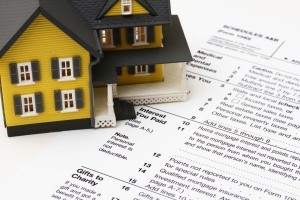Homeowners enjoy a variety of tax breaks!
Categories: Tips | Posted: April 16, 2015
With tax season upon us, it’s a good idea to remind new (and potential) homeowners that in addition to the joy of owning your own home, you also inherit new tax considerations. The good news is you can deduct many home-related expenses. These tax breaks are available for any abode, whether single-family home, townhouse or condominium. The bad news is your taxes will get more complicated. In most cases, homeowners itemize. That means you move to Form 1040 and Schedule A, where you’ll have to detail your tax-deductible expenses.
If you do find that itemizing is best for your tax situation, here’s a look at homeowner expenses you can deduct on Schedule A.
- Mortgage interest
Your biggest tax break is reflected in the house payment you make each month since, for most homeowners, the bulk of that check goes toward interest. And all that interest is deductible, unless your loan is more than $1 million. Interest tax breaks don’t end with your home’s first mortgage. Did you pull out extra cash through refinancing? Or did you decide instead to get a home equity loan or line of credit? Generally, equity debts of $100,000 or less are fully deductible.
- Points
Did you pay points to get a better rate on any of your various home loans? They offer a tax break, too. The only issue is exactly when you get to claim them. The IRS lets you deduct points in the year you paid them if, among other things, the loan is to purchase or build your main home, payment of points is an established business practice in your area and the points were within the usual range. Make sure your loan meets all the qualification requirements so that you can deduct points all at once.
- Taxes
The other major deduction in connection with your home is property taxes.
A big part of most monthly loan payments is taxes, which go into an escrow account for payment once a year. This amount should be included on the annual statement you get from your lender, along with your loan interest information. These taxes will be an annual deduction as long as you own your home. If this is your first tax year in your house, dig out the settlement sheet you got at closing to find additional tax payment data. When the property was transferred from the seller to you, the year’s tax payments were divided so that each of you paid the taxes for that portion of the tax year during which you owned the home. Your share of these taxes is fully deductible.
- Home improvements
Save receipts and records for all improvements you make to your home, such as landscaping, storm windows, fences, a new energy-efficient furnace and any additions. You can’t deduct these expenses now, but when you sell your home the cost of the improvements is added to the purchase price of your home to determine the cost basis in your home for tax purposes. Although most home-sale profit is now tax-free, it’s possible for the IRS to demand part of your profit when you sell. Keeping track of your cost basis will help limit the potential tax bill.
- Energy credits
Some energy-saving home improvements can earn you an additional tax break in the form of an energy tax credit worth up to $500. A tax credit is more valuable than a tax deduction because a credit reduces your tax bill dollar-for-dollar. You can get a credit for up to 10% of the cost of qualifying energy-efficient skylights, outside doors and windows, insulation systems, and roofs, as well as qualifying central air conditioners, heat pumps, furnaces, water heaters, and water boilers. There is a completely separate credit equal to 30% of the cost of more expensive and exotic energy-efficient equipment, including qualifying solar-powered generators and water heaters. In most cases there is no dollar cap on this credit.
What’s not tax deductible
While many tax breaks are available to a homeowner, there are a few things for which you have to bear the full cost.
- Private mortgage insurance, or PMI, is a cost you probably won’t be able to deduct, unless you meet the requirements of a special PMI law.
- Property hazard insurance premiums remain non-deductible, even though the coverage generally is required as part of the home loan and is included as a portion of your monthly payment.
- Homeowners association dues, any additional principal payments you make, depreciation of your home, and general closing costs and local assessments to increase the value of your neighborhood, such as construction of new sidewalks or utility connections, are non-deductible.
Homes by DHR is a new home builder in Shawnee, Pottawatomie County, OK. Contact info@homesbydhr.com or call 405-888-5430 for more information.




